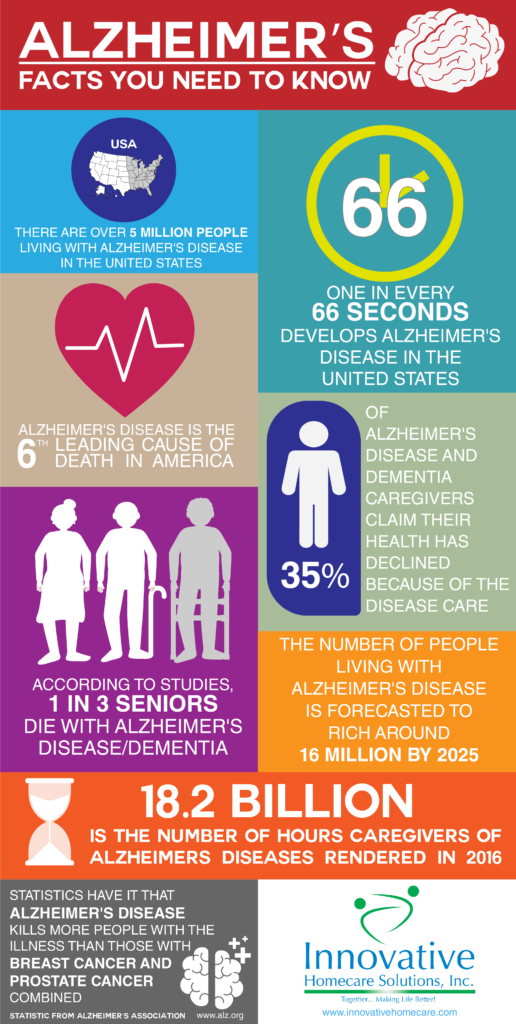Alzheimer’s Care at home includes an array of services offered in the home of a senior with Alzheimer’s disease or other dementia. These kinds of services are also known as in-home services. They are called as such because the care is provided inside the home of the patient. Not all in-home services, though, are the same. Some residential care services offer non-medical assistance like help with daily living.
Other services, on the other hand, involve medical assistance, which a licensed health professional like a physical therapist or a skilled nursing professional. There is a difference between regular in-home care and Alzheimer’s home care. Regular in-home care refers to the type of care from which individuals can receive medical support. Examples of these are insulin injections and monitoring of vital signs, to name a couple.
As for Alzheimer’s care at home, this is a type of care a loved one can receive, also, inside his home. While the live in caregiver provides assistance as the regular home care provider, the one offering Alzheimer’s care at home is quite familiar with the stages of the illness. He or she knows when it manifests, and the usual challenging behaviors. More so, he also knows the strategies to appropriately deal with them, and safety and security issues that are related to Alzheimer’s and dementia.
Typically, care plans are developed to concentrate on likes, dislikes, as well as the personality of elderly individuals with Alzheimer’s. Activities are planned accordingly, as well, to stimulate the memory of the client. Among the activities include looking at the pictures in a photo album, listening to music, and reading, to name a few. Surprisingly, Alzheimer’s disease care usually costs just the same as the standard home health care.
Common In-Home Services Types for Dementia Care
Are you a family member with senior loved ones who are in their early stages of Alzheimer’s disease? Then, it is crucial to know the common types of services your loved ones can possibly receive from their live in caregiver. They are somewhat different from what’s being rendered at a care facility. But most of the time, the services delivered at home are the same quality care which a family caregiver gives his or her loved one with Alzheimer’s disease.
- Companion Services – Such services offer assistance with supervision, visiting, or recreational dealings of the client.
- Homemaker Services – This type of service offers support with housekeeping, meal preparation, or shopping.
- Personal Care Services – This type of Alzheimer’s care allows the caregiver to assist the client with activities he cannot do by himself, like toileting, exercising, personal care, bathing, or dressing.
- Skilled Care – This may already fall under medical care as it provides help with injections, wound care, physical therapy, and all other medical needs which licensed health professionals to provide. More often than not, a home care services provider like Innovative Homecare Solutions, Inc. coordinates this type of Alzheimer’s Care at home once a physician has ordered it.
- Talking with the client’s doctor – The main physician who provides care for the older adult with Alzheimer’s is a great person to start receiving care. Ask for suggestions from home health providers that have experience caring for people with dementia.
Facts You Need To Know About Alzheimer’s Disease

How to Find the Right Care for Your Loved One
When there’s a senior in the family, there are so many things to consider when getting care from another family member or a professional caregiver. Are you planning to take the older adult to a nursing home or any other similar facility? Having the care provided at home entails some major considerations — one is, whether the elderly individual needs respite care or any other type of care. To know the specific care your parent or grandparent needs, consider doing the following:
- List down the care types available
- More so, before you contact the prospective providers, make a list of care needs. Include the types of care, and your expectations on the manner the needs should be met. Call the prospects first. And, when you do, start screening each provider you talk to. Of course, it is important to find out how they can help your senior loved one.
- After the shortlisting, conduct an interview at home.
- Before the interview schedule, prepare your questions ahead. It is also a good idea if you have a third person with you during the interview. He can help you find out some impressions about your prospect.
- Double-check your references.
- Some home care agencies conduct criminal background checks with their caregivers. This is to be sure they are providing their clients not only with the best caregivers but the most trusted ones, as well. Innovative Homecare Solutions does its own background check, which you, as the client, can inquire about, should you find someone that matches the care needs for your loved one.
- Make the care provider familiar with previous accomplishments.
- Make the caregiver familiar too, with guideposts, and fond memories relevant to where the current memory of the person with Alzheimer’s disease or dementia is strong. By doing so, you are allowing for a much greater bond develop between the caregiver and the older adult.
